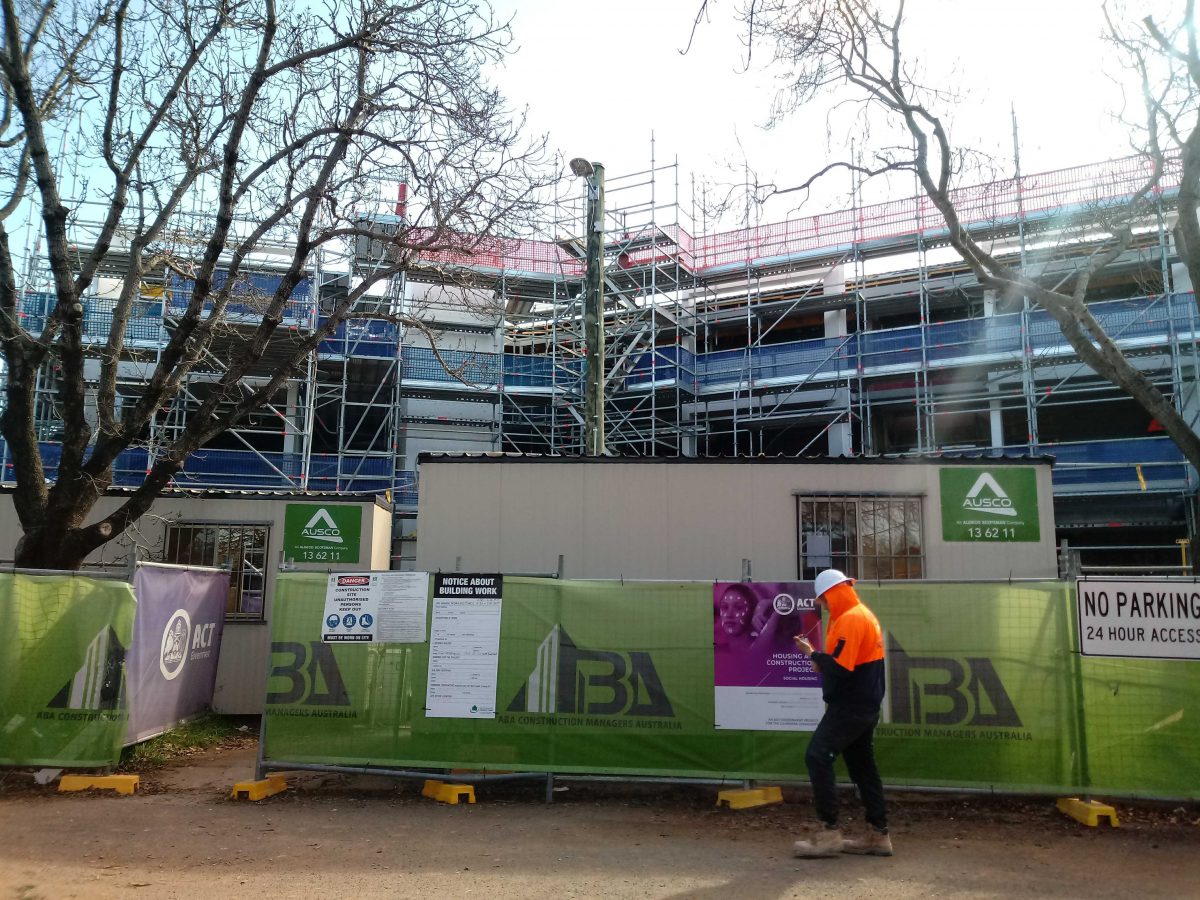
An audit report has found that the ACT’s Growing and Renewing Public Housing Program might be delivering better homes, but in real terms, stock is going to go down. Photo: File.
A new report examining a program designed to grow and improve public housing stock has found it won’t deliver more homes in real terms and could restrict supply in the future.
The Auditor-General looked into the ACT Government’s Growing and Renewing Public Housing Program, an eight-year, $860 million program designed to deliver 1400 new public housing homes in the Territory through new builds and redevelopment of older stock.
The original program was over five years at a cost of $600 million.
The audit examined the management of the program and found that while it will result in a net increase of 400 public housing homes by 2027 (compared to 2019); in real terms, available housing stock will not grow.
“This represents a decrease in the supply of public housing homes relative to population because the number of people living in the ACT is increasing,” the report noted.
There are currently about 26 public housing homes per 1000 people in the ACT. If the program reaches its targets, there will be about 24 homes per 1000 people. That’s down from approximately 28 public housing homes per 1000 people in 2018.
It also found that the program’s reliance on the sale or redevelopment of older homes will limit future larger-scale growth or redevelopment of low- and medium-density public housing options.
“[This is] due to limited remaining supply of public housing homes that are suitable for sale or redevelopment and increasing costs of construction,” the report noted.
“Housing ACT also advised that the supply of existing public housing land sites capable of yielding 1:4 redevelopment (replacing one home with four homes) will be exhausted by the conclusion of the program.
“This means that remaining land sites in the public housing portfolio are likely to yield a maximum of 1:2 or 1:3 redevelopment potential.”
Given the ACT’s ‘salt and pepper’ approach to public housing, this could restrict the number of updated dwellings that can be built in established suburbs.
The dwellings being built at the moment, especially in newer areas, have been chosen to better match tenant needs as some homes are currently underutilised while others are overcrowded.
But this could create a problem down the line.
“Most in-progress and planned construction of new public housing in new suburbs is medium-density housing,” the report noted.
“This has compromised Housing ACT’s ability to continue an even distribution of low-density public housing across all ACT suburbs.”
The cost of delivery has been impacted by many factors, including the COVID-19 pandemic and resulting supply and skills issues, rising costs and adverse weather events.
New accessibility and adjustability standards for public housing mean the cost of building new homes has increased from an average of $411,000 per home in 2019-20 to an estimated $568,000 per home over the program’s lifetime – a blowout of around 38 per cent.
Increasing construction costs also mean that the sale of one public housing home will not generate “sufficient revenue” to build more than one new home.
The report also examined the negative impacts that tenant forced relocation had on people’s wellbeing and how communication practices could be improved.
The program came under intense scrutiny when it changed from allowing tenants to voluntarily move out to forcible relocations.
An ACT Ombudsman review found Housing ACT caused distress to vulnerable tenants and didn’t communicate appropriately or effectively with those they were relocating.
The ACT Government ended up backtracking on the forced relocations and apologising.
Three public housing tenants took the ACT Government to the Supreme Court saying their relocation breached the Human Rights Act 2004. A reserved decision is expected this year.
A class action has also been filed in the Federal Court.
The report found governance and administrative arrangements for the program were “generally effective”, but gaps in these arrangements “undermined” Housing ACT’s ability to implement an “effective collaborative, cross-sector approach” to relocate public tenants and mitigate emerging risks to tenant wellbeing and program delivery.
Another flaw was that the collaborative reference groups established to support the program – the Growing and Renewing Inclusive Partnerships (GRIP) and sub-group Growing and Renewing Individualised Supports Partnership (GRISP) – lacked a formal mechanism for their reporting outcomes, meetings or activities to be communicated to the program’s Operational Committee or Steering Committee.
The Auditor-General made three recommendations around embedding a collaborative, cross-sector approach, consolidating all criteria and information needed for making decisions about public housing homes, and implementing a “quality assurance framework” for decisions made by the Asset Assessment Panel.
The Community Services Directorate (which oversees Housing ACT) has already agreed to the recommendations.
The ACT Audit Office has also begun a subsequent audit to examine Housing ACT’s practices for making decisions about public housing homes, selling and buying public housing homes, and procuring services to build new public housing homes.




















